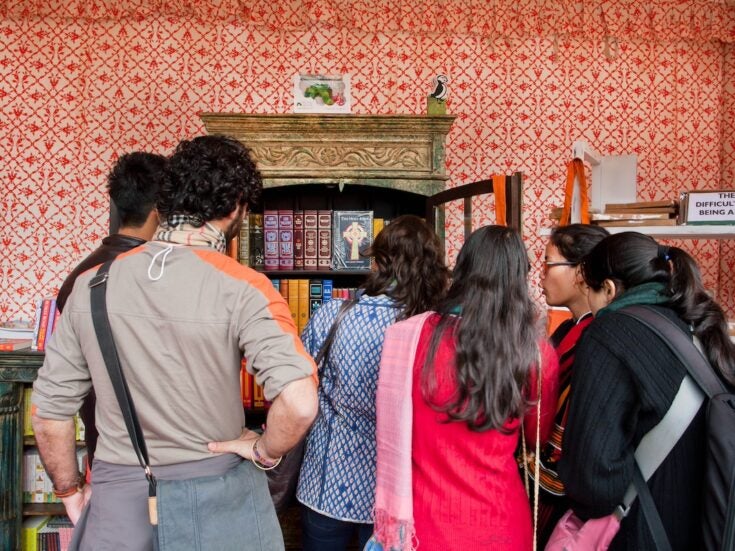
A visit to the Viceroy’s House in New Delhi gives Clive Aslet occasion to reflect on the extent to which India’s colonial period has come to seem little more than a distant, half-remembered dream
ISN’T IT ABOUT time George V was rehabilitated? I don’t mean from Michael Gambon’s incisive portrayal in The King’s Speech. Nor in the popular consciousness, for — like most kings and queens except Henry VIII — he hardly figures. Beyond the words with which he supposedly bade farewell to this world (‘Bugger Bognor’), most people have little impression of this choleric, uninspiring, family-minded monarch, with his naval officer’s turn of phrase and exceptional skill with a shotgun.
No, I am thinking of his position in Delhi. Once his statue stood at the other end of the Rajpath from Lutyens’s Viceroy’s House; now the canopy is empty and he has been banished to a corral provided for unwanted ‘Britishers’ from around the country, in Coronation Park. There they are, ermine-robed, looking about as lively in each other’s company as they perhaps were in life. What a fate.
Still, the location is appropriate. Coronation Park was the site of the three durbars the British held in Delhi. The first, in 1877, was to announce to the assembled maharajas, princes and administrators that they now had an Empress as well as Queen, in the cottage loaf shape of the Widow of Windsor. In 1903, Lord Curzon stole the show by mounting a spectacle of incomparable splendour, made more striking by the picturesquely medieval trappings that were still the ceremonial wear in some states.
By the time George V trundled out to the Subcontinent a century ago this year, the modern age had started to impinge. 1911 became known as the Motor Durbar. This being India, stupendous numbers were involved; at the Red Fort, the King/Emperor and his consort, Queen/Empress Mary, appeared on a balcony (nothing new there) to wave to a crowd of half a million people. But there was also an underswell of symbolism to the occasion; the durbar site was chosen because of its proximity to the ridge on which a beleaguered corps of soldiers put up a desperate fight before repacifying Delhi during what the British persist in calling the Indian Mutiny of 1857.
NEWSREEL FOOTAGE GIVES a jerky impression of the scene. A stickler for correct dress, George V wore his robes of state, his head weighted by the Imperial Crown of India, specially created for the occasion. Like so many conquerors through the centuries, the British officials, in blue uniforms, looked restrained, even dingy, beside the gorgeously apparelled potentates — male, except for the Begum of Bhopal — who laid swords at the Royal feet before retreating backwards, with some difficulty, down the steps of the dais. But the judiciary made up for it: if not as bejewelled as some other durbarees, at least absurdly bewigged.
It was a long day. At the end, the King, with the bathos of which he was such a master, complained of a headache.

Still, he did manage one coup de théâtre. It is difficult to imagine in this age of leaks, but complete secrecy had been maintained about the government’s decision to move the imperial capital from Calcutta to Delhi. New Delhi arose on a site to the south of Coronation Park, now (even on Delhi’s new roads) half an hour’s drive away. But the Viceroy’s House, 630ft wide, its footprint larger than the Palace of Versailles, built on a platform which, Acropolis-like, also accommodated two majestic Secretariat buildings by Sir Herbert Baker, preserved the spirit of the Durbar: the architecture (even Baker’s) cannot fail to impress visitors with the ordering of scale and space. Here was calm, here was confidence: Pax Britannica in stone.
The confidence was, of course, misplaced. When the Viceroy’s House was finished in 1927, the Raj had a mere two decades left to run. There had been more than a hint of change in 1911. ‘India has changed greatly in the last ten years,’ remarked The Times. Plus ça change.
Courtesy of the new Leela Palace Hotel, I was given a tour of the Viceroy’s House, now the President’s official residence, by a young guide who clearly found everything about Lutyens and the imperial past to be a matter of the profoundest ennui. She took pains to dilate on Hindu sculptures, portraits of post-Independence dignitaries, gifts from visiting heads of state, photographs of staff, viceregal crockery — everything except the controlled pomp of the architecture through which we walked. Mustn’t complain. It is all beautifully kept up. But the meaning of the epic urban conception — grander than even the dreams of Renaissance popes — has been Photoshopped out of the picture.
As one living in London, I couldn’t help reflecting on the irony of this, with Bollygarchs staging a reverse takeover of the British Empire. Here are the Curzons de nos jours. There are signs that the powers in India have begun to take a more indulgent view of the colonial past. Now a scrubby recreation ground, where one of my party was nearly brained by a cricket ball from one of the many games taking place, Coronation Park is to be restored, they say. Surely, they might as well return George V to his Rajpath canopy while they’re about it? It would be the ultimate sign of self-confidence.







